Events & Promotions
| Last visit was: 09 May 2024, 19:41 |
It is currently 09 May 2024, 19:41 |

Customized
for You
Track
Your Progress
Practice
Pays
08:00 PM PDT
-09:00 PM PDT
01:00 PM PDT
-02:00 PM PDT
08:30 AM PDT
-09:30 AM PDT
12:00 PM PDT
-01:00 PM PDT
10:00 AM PDT
-11:00 AM PDT
10:00 AM PDT
-11:00 AM PDT
12:00 PM EDT
-01:00 PM EDT
10:00 AM EDT
-10:30 AM EDT
11:00 AM IST
-12:00 PM IST
11:00 AM IST
-12:00 PM IST
05:00 PM PDT
-06:00 PM PDT
| FROM Stacy Blackman Consulting Blog: Should You Get a Master in Management Degree? |
 Are you wondering whether a Master in Management (MiM) degree is the right path for you? Let’s break down the pros and cons so you can make an informed decision. Master in Management (MiM): Masters for the Management Enthusiast This degree is tailor-made for those looking to dive headfirst into management roles and make a splash early on in their careers. (You can read about the top MiM programs in the U.S. on Poets & Quants.)  The Pros Early Bird Advantage: MiM programs often welcome fresh graduates. If you’re itching to climb the corporate ladder sooner rather than later, a MiM can equip you with the necessary tools right off the bat. Specialization: MiM programs often offer specialized tracks in areas like marketing, finance, or entrepreneurship. If you know the field you want to conquer, a MiM can provide you with targeted knowledge and skills. Short and Sweet: MiM programs are usually short in duration. You can earn your degree quickly and jump into the professional world, saving time and tuition fees. The Cons Limited Work Experience: While fresh perspectives are great, limited work experience might mean you’ll be learning about real-world challenges without firsthand experience to relate to. This could make certain concepts feel abstract. Networking Nuances: The network you build during a MiM might be less vast and varied than what you’d find in an MBA program. This could affect your post-graduation opportunities. Depth vs. Breadth: MiM programs can be more narrowly focused on management-specific skills, which might not provide the broad overview of business that an MBA offers. This might limit your career trajectory in the long run.  Making Your Choice: It’s About You In the end, what matters most is your personal and professional goals. If you’re a fresh graduate with a clear vision of your field and role, and you’re raring to kickstart your management journey without years of work experience, the Master in Management might be the way to go. Remember, there’s no one-size-fits-all answer. Your decision should hinge on your career aspirations, financial considerations, and learning preferences. So, gather intel, talk to MiM grads, and consider consulting a career counselor. Your graduate management degree should align with your personality, ambition, and timeline. In recent years, many deferred MBA admissions programs have become popular among college seniors. So, this route is well worth evaluating before you make your graduate school decision. Learn more about how deferred MBA programs work and hear directly from past SBC clients who have chosen this route. As one successful client for Stanford’s deferred MBA admissions program shared: “The great thing about deferred MBA programs is that you get access to an amazing network of the most interesting, smart people you’ll ever meet years before you even start your MBA. So, connecting with these people early on has enabled me to jump start that self-reflection process by learning from others. That’s a huge benefit of the deferred programs that I think isn’t talked about enough.” *** Stacy Blackman Consulting offers multiple services to meet your needs, from our All-In Partnership to test prep to hourly help with targeted tasks. Contact us today for a free 15-minute advising session to talk strategy with a Principal SBC consultant. Meanwhile, here’s a snapshot of the caliber of expertise on our SBC team:  The post Should You Get a Master in Management Degree? appeared first on Stacy Blackman Consulting - MBA Admissions Consulting. |
| FROM Stacy Blackman Consulting Blog: Tuesday Tips: USC Marshall Application Essays, Tips for 2023-2024 |
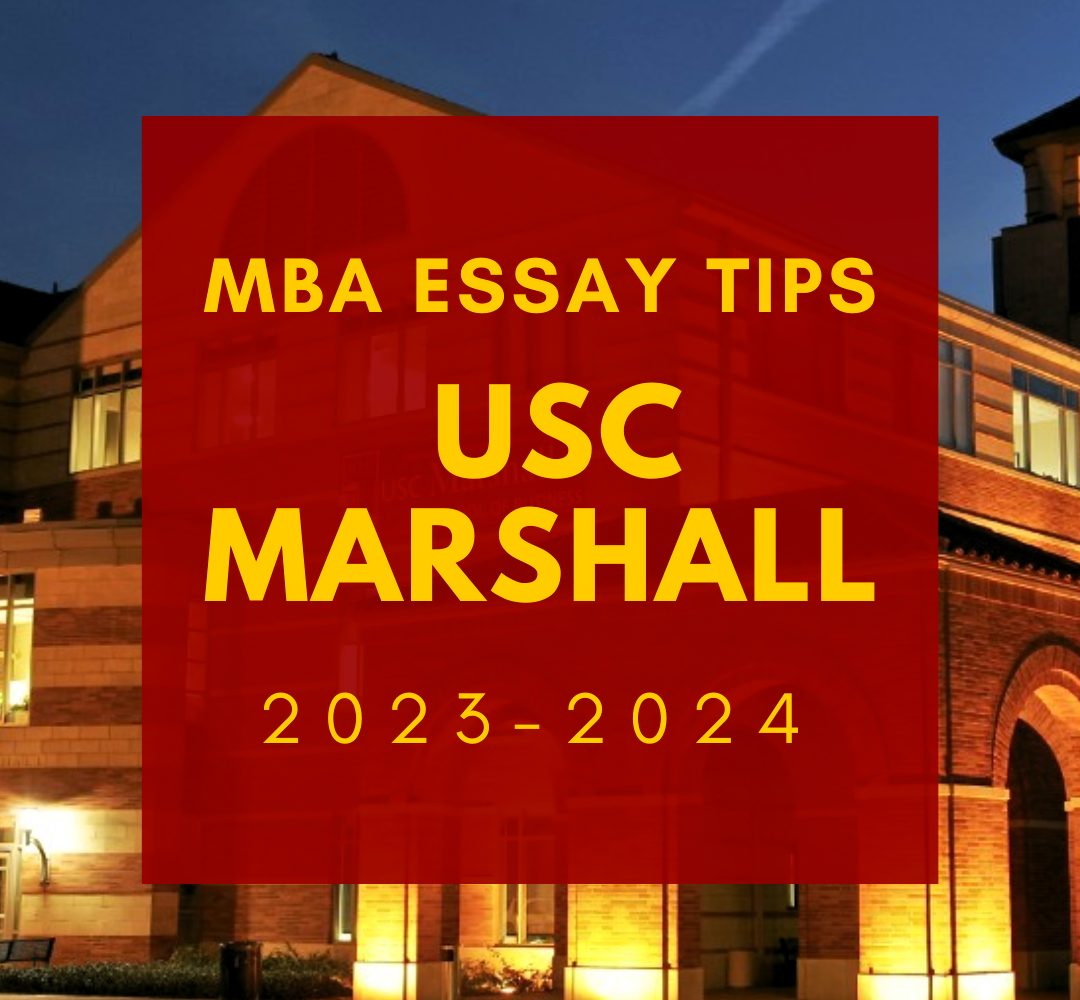 The USC Marshall School of Business reflects the diversity and dynamism of the Los Angeles area. These USC Marshall application essays allow you the space to express how you will fit into the community. Though Marshall is a community of its own, the larger USC Trojan Family is an integral part of the school’s identity and offers additional academic opportunities for MBA students. “At Marshall, our focus is on producing leaders with the skills to turn ideas into outcomes for the real world, right now,” says Dean Geoffrey Garrett. “Our award-winning faculty thought leadership and experiential learning environment creates leaders who are visionary and adaptable; prepared not only for the jobs of today, but also for future careers not yet imagined that the Marshall community will help shape.” Because community is so vital to this USC Marshall application, the admissions office wants to know who you are as a person. As such, the AdCom team doesn’t subscribe to the concept of the “perfect” or “ideal” candidate. Everyone has a unique story. As you prepare your USC Marshall application, make sure to do your research. Remember to include talking to current and former students so that you can better understand the culture in depth. To learn more about the program, visit the USC Marshall website. Are you curious about your chances of getting into a top business school? Contact us to talk strategy with a free 15-minute advising session with an SBC Principal Consultant.  Essay #1 (Required) What is your specific, immediate short-term career goal upon completion of your MBA? Please include an intended position, function, and industry in your response. (word limit: 100) With only 100 words to use here, stay brief, and focused in this USC application essay. Consider your plan when you graduate from USC. And make sure your resume and other application materials support this next step. For example, if you are career switching, highlight any transferable skills in your resume. Another idea is to ask your recommenders to comment on your future plans. Further, as you craft all of these strategies, make sure you highlight how you will use your MBA to reach your goals. What if your next job is a logical step from your prior experience to your MBA? Even if you think it’s obvious, it’s essential to be specific about your career goals. Describe the job you plan to pursue with as much detail as possible. 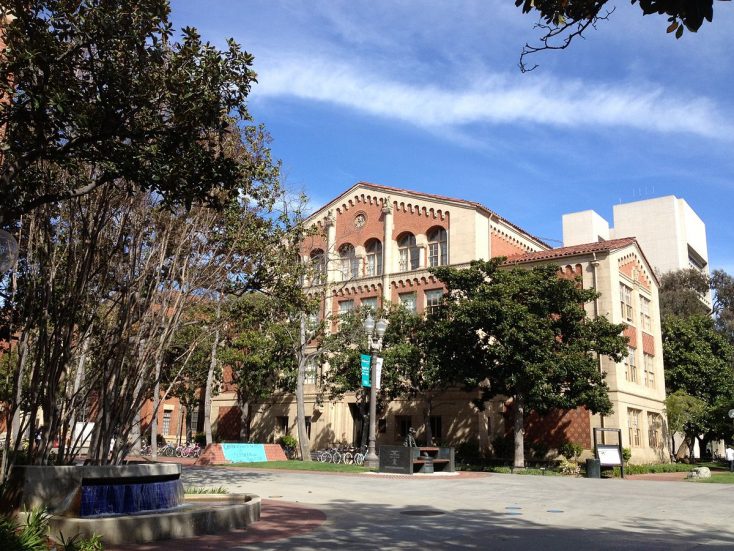 Essay #2 (Required) Please draft a letter that begins with “Dear Admissions Committee” (word limit: 600) This letter serves as your personal statement that provides the Admissions Committee with an understanding of your candidacy for Marshall beyond what is evident in other parts of your application. This essay is purposely open-ended. You are free to express yourself in whatever way you see fit. The goal is to have an appreciation for and an understanding of each candidate in ways that are not captured by test scores, grades, and resumes. Showing who you are as a person is essential to your USC Marshall application. Ideally, you can demonstrate that you understand the USC culture and values with your answer to this essay question. First, start with your statistics and data. USC Marshall will see your GPA, your test scores, and your transcripts. Second, the admissions committee will see your career progress on your resume. Third, you will add some personal color to your application through the recommendation letters. These elements should show that you have leadership potential, academic promise, and a well-rounded personality. This essay is the place to fill any gaps. Consider what you need to communicate to show all sides of your candidacy in this USC application essay. For example, if you are someone who has a standard career history, you might describe something interesting in your background. Perhaps you have an unusual hobby, have made an impact on the community, or have a unique family heritage.  Another aspect of your USC Marshall application that may not appear in your data is your passion for learning. For instance, if there is a professor you would want to work with, this question is an opportunity to discuss their work. Similarly, you may want to join or lead a club or community effort that isn’t obvious from the other data you submit. Essay #3 (Optional) Please provide any additional information you would like the admissions committee to consider. (word limit: 250) This USC application essay offers an opportunity to add more information or to discuss a concern. Therefore, if you have a low GPA, a grade below a C in a quantitative subject, an employment gap, or any other issue in your background, this is the place to explain it. However, if you want to highlight anything else about your career path, experience, or personal background, this essay allows you the space to do so. And, if you need to explain an area of concern, clearly explain what happened and what you have done to improve or address the issue. Focus on the future in a positive manner to leave the strongest impression. *** For more information on applying to USC Marshall, please visit the school’s admissions page. To talk to Stacy Blackman Consulting about your Cambridge MBA essays, don’t hesitate to contact us! We offer multiple services to meet your MBA application needs, from our All-In Partnership to hourly help reviewing your MBA resume. Contact SBC today for a free 15-minute advising session to talk strategy with a Principal SBC consultant. The post Tuesday Tips: USC Marshall Application Essays, Tips for 2023-2024 appeared first on Stacy Blackman Consulting - MBA Admissions Consulting. |
| FROM Stacy Blackman Consulting Blog: B-Schooled Podcast Episode #176: Before You Submit in Round 1 |
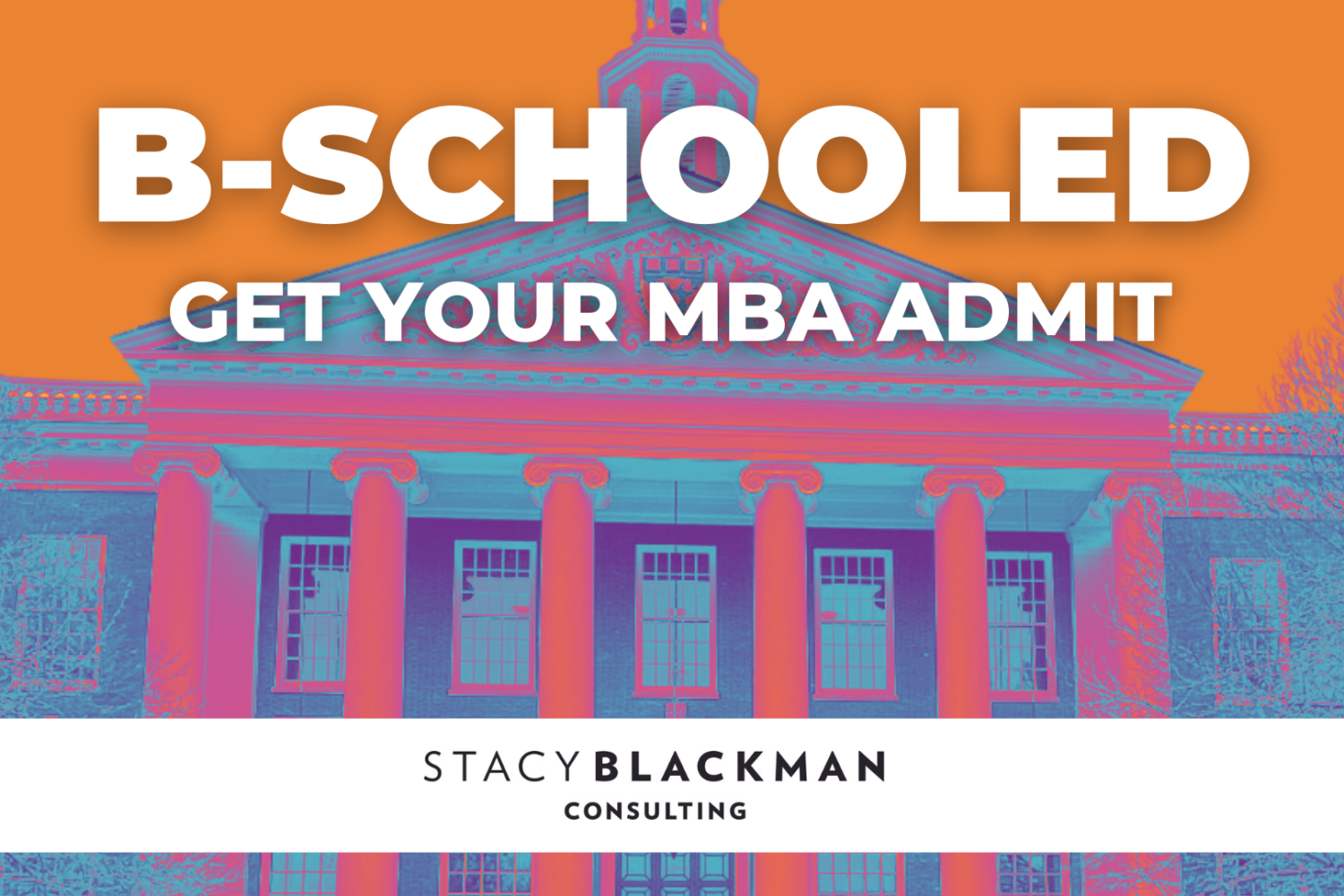 Round 1 deadlines are upon us, and frayed nerves tend to get the best of many candidates. This timely replay covers common last-minute traps that MBA applicants fall into and how to avoid them, as well as what you should and should not do before hitting submit. If you’re submitting an application in the coming weeks, this is one episode you won’t want to miss! Listen to B-Schooled episode #176 here or on any of the podcast apps listed below. B-Schooled is available on most major podcast apps, including: Apple Podcasts Spotify Stitcher TuneIn Please be sure to subscribe to B-Schooled so that you don’t miss a thing. Also, if there’s something you’d like for us to cover in a future episode, please email podcast@stacyblackman.com. We’d love to hear from you! The post B-Schooled Podcast Episode #176: Before You Submit in Round 1 appeared first on Stacy Blackman Consulting - MBA Admissions Consulting. |
| FROM Stacy Blackman Consulting Blog: Best Ways for MBA Applicants to Explain Frequent Job Changes |
|
[img]https://www.stacyblackman.com/wp-content/uploads/ross-findon-mG28olYFgHI-unsplash-1500x1000.jpg[/img] So, you’ve decided to embark on the adventure of a lifetime by pursuing an MBA degree. You’ve got [url=https://www.stacyblackman.com/blog/b-schooled-podcast-171-school-strengths-and-selection/]your sights set[/url] on the perfect program, [url=https://www.stacyblackman.com/blog/sell-yourself-with-an-mba-resume/]your resume[/url] is polished, and your [url=https://www.stacyblackman.com/blog/recommendation-letter-mba/]recommendation letters[/url] are in the works. But there’s a little something that’s been nagging at you: those frequent job changes on your CV. Fear not, for you’re not alone in that boat; many MBA applicants have hopped from one job to another. Thankfully, there is a way to explain frequent job changes in a way that will impress your application reader rather than raise eyebrows. [b]Curious about your chances of getting into a top B-school? [url=https://www.stacyblackman.com/contact/]Contact us[/url] to talk strategy with a free 15-minute advising session with an SBC Principal Consultant.[/b] [img]https://www.stacyblackman.com/wp-content/uploads/valeriia-miller-kPbk0zrxY8M-unsplash-1500x1000.jpg[/img] First things first, honesty is key when addressing your frequent job changes. Admissions committees appreciate transparency. While it might be tempting to gloss over these transitions, it’s best to provide a clear and truthful account of your career path. Highlight the [url=https://www.upgrad.com/blog/how-to-answer-for-job-change-in-interview/]reasons for each change[/url], whether it was to seek new challenges, gain diverse experiences, or pursue your passion. For example, you might explain, “I moved from Company A to Company B because I felt a strong desire to work in a different industry and broaden my skill set.” This demonstrates your adaptability and willingness to take risks, qualities that can be valuable in an MBA program. Showcase Growth and Learning When you’ve changed jobs frequently, it’s essential to show that each transition wasn’t just a lateral move but an opportunity for growth and learning. Discuss how you leveraged your skills and experiences from one role to excel in the next. You could say something like, “During my time at Company C, I faced several challenges that pushed me out of my comfort zone. I had to quickly adapt to new technology and lead a team through a major project. These experiences helped me develop strong problem-solving skills and a knack for leadership, which I believe will be valuable in the MBA program.” By emphasizing the skills you’ve acquired and the lessons you’ve learned, you’re positioning your job changes as stepping stones in your professional journey. Listen to [url=https://www.stacyblackman.com/blog/b-schooled-podcast-163-highlighting-what-youve-learned-how-youve-grown/]B-Schooled Podcast #163[/url]: Highlighting What You’ve Learned and How You’ve Grown One of the most effective ways to explain frequent job changes is to connect the dots between your various roles. Show how each change was part of a broader plan or strategy to achieve your long-term career goals. For instance, “While my career path may seem unconventional, each move was deliberate. I wanted to gain expertise in different aspects of the business world, from marketing to operations. These diverse experiences have equipped me with a well-rounded perspective that I believe will benefit my classmates in the MBA program.” By demonstrating that your job changes were part of a thought-out career progression, you present yourself as a strategic thinker who has carefully crafted their path. [img]https://www.stacyblackman.com/wp-content/uploads/giorgio-trovato-_XTY6lD8jgM-unsplash-1500x1000.jpg[/img] Highlight Your Achievements When Explaining Frequent Job Changes Don’t forget to shine a spotlight on your accomplishments during each job, regardless of how short the stint was. Admissions committees are interested in your impact and contributions. Even if you were in a role for a relatively brief period, there’s likely something noteworthy you achieved. Say something like, “During my tenure at Company D, I spearheaded a project that resulted in a 20% increase in revenue within six months. While my time there was brief, I was able to make a meaningful impact on the organization.” By focusing on your achievements, you not only demonstrate your value as an employee but also your ability to make the most of any opportunity, no matter how short-lived it may be. [b]Address Any Red Flags[/b] If there are any job changes that might raise concerns, such as [url=https://www.stacyblackman.com/blog/3-ways-to-explain-a-job-loss-in-the-mba-application/]terminations or layoffs[/url], address them proactively but briefly. Explain the circumstances without dwelling on them and focus on the positive outcomes and lessons learned. For example, “I experienced a period of layoffs at Company E due to a corporate restructuring. Although it was a challenging time, it taught me resilience, adaptability, and the importance of seeking opportunities for growth even in adversity.” By acknowledging and addressing any red flags, you demonstrate maturity and the ability to handle difficult situations gracefully. Listen to [url=https://www.stacyblackman.com/blog/b-schooled-podcast-episode-65-career-narratives-for-those-with-several-employers/]B-Schooled Podcast #65[/url]: Career Narratives for Those with Several Employers [b]Show Commitment to Your MBA Goals[/b] Finally, you can tie it all together by emphasizing your commitment to your MBA goals. Explain how your past experiences, including the frequent job changes, have led you to pursue an MBA and how the program aligns with your long-term aspirations. You could say, “My career journey has been a series of learning experiences that have shaped my desire to pursue an MBA. I’m eager to leverage the skills and knowledge I gain in the program to achieve my goal of leading innovative initiatives in the tech industry.” Explaining frequent job changes on your MBA application is all about framing them in a positive light. Be honest, focus on your growth and achievements, connect the dots, address any concerns, and, most importantly, show your unwavering commitment to your MBA goals. Remember, it’s not about the number of job changes. rather, it’s the story you tell about how they’ve shaped you into the ideal MBA candidate. Embrace your unique journey, and the admissions committee will likely do the same. Good luck! *** With [url=https://www.stacyblackman.com/comprehensive-services/]SBC’s All-In Package[/url], we’re turning No’s into Yes’s by teaching you how to build the type of application that competitive MBA programs want to receive. Learn how to remodel shortcomings into strong points, write compelling essays, strategize for admission tests, ace interviews, and be the strongest applicant you can be. [url=https://www.stacyblackman.com/contact/]Reach out today[/url] to learn more about all of our services. Meanwhile, here’s a snapshot of the expertise on our [url=https://www.stacyblackman.com/about/mba-admissions-consulting-team/]consulting team[/url]: [img]https://www.stacyblackman.com/wp-content/uploads/HBS-and-GSB-consultants-.png[/img] The post [url=https://www.stacyblackman.com/blog/explaining-frequent-job-changes/]Best Ways for MBA Applicants to Explain Frequent Job Changes[/url] appeared first on [url=https://www.stacyblackman.com]Stacy Blackman Consulting - MBA Admissions Consulting[/url]. |
| FROM Stacy Blackman Consulting Blog: Mine the Wisdom of Current MBA Students |
 Embarking on the MBA journey is a huge decision that can profoundly shape your career and future. As you navigate the maze of choices, there’s one invaluable resource to consider. We’re talking about the wisdom of those who have been there and done that—current MBA students. Today, we’ll explore why speaking with current students is crucial before applying to MBA programs. We’ll also provide some practical tips on initiating these conversations. Are you curious about your chances of getting into a top business school? Contact us to talk strategy with a free 15-minute advising session with an SBC Principal Consultant. Why Talk to Current MBA Students? In a recent post on the admissions blog at Michigan Ross School of Business, the AdCom team encourages all MBA applicants to reach out to their 300-plus student ambassadors as part of their program research process. “Chatting with students is an opportunity to get firsthand perspectives on our school’s academics, recruiting, student clubs, the Ross community, what living in Ann Arbor is like coming from places like New York, San Francisco, Tokyo, Sao Paulo, Lagos, etc., what they were looking for in a school, and how Ross met their criteria,” they write.  By connecting with current MBA students, you’ll discover: Insider Insights: These students know firsthand the program’s strengths, weaknesses, and unique features. They can also provide candid insights into the day-to-day life, the rigor of coursework, and the program culture, helping you make an informed decision. Realistic Expectations: Speaking with current students can help you set realistic expectations about what to expect during your MBA journey. You’ll better understand the workload, time commitments, and challenges you may face. Networking Opportunities: Building relationships with current students can be the gateway to a robust professional network even before you begin your MBA. They can introduce you to alums, professors, and industry connections that can benefit your career. Program Fit: Every MBA program has its unique culture and focus areas. Current students can help you assess whether a particular program aligns with your career goals, values, and aspirations.  How to Connect with Current MBA Students Use Social Media: Platforms like LinkedIn, Facebook, and Twitter can be excellent resources to find and connect with current MBA students. Many MBA programs have dedicated groups or pages where students and applicants interact. Join these groups and start engaging in discussions. Attend Virtual Info Sessions: MBA programs often host virtual information sessions where current students share their experiences. These sessions provide a chance to hear their insights, ask questions, and sometimes even connect with them directly. Reach Out via Email: Most programs list contact information for their students in leadership positions. Don’t hesitate to send a brief, polite email expressing your interest and asking if they would be willing to chat or answer your questions Use Alumni Connections: If you have connections with alums from your desired MBA program, ask if they can introduce you to current students. Alums often have strong networks within their alma mater. Campus Visits: If feasible, visiting the campus and attending MBA program events can be a great way to meet current students in person. This allows for more personal and meaningful conversations.  What Questions to Ask Current MBA Students Once you’ve established contact with current MBA students, asking the right questions is essential. Here are some questions to consider: Why did you choose this MBA program? Understanding their motivations can give you insights into what the program offers that appeals to them. What has been the most rewarding aspect of your MBA journey so far? This question can reveal the strengths and highlights of the program. What has been the most challenging part of your MBA experience? Learning about challenges can help you prepare for potential hurdles. How accessible are professors and staff for support and guidance? Access to faculty and staff is crucial for academic and career development. How would you describe the program’s culture and student community? Assessing the program’s culture can help you determine if it’s a good fit for you. What advice would you give to someone considering this MBA program? Current students’ advice can be invaluable in making your decision. How do you balance your coursework, extracurricular activities, and personal life? Understanding time management and work-life balance is crucial for success. Listen to B-Schooled Podcast #153: Connecting with MBA Students, Faculty and Alums Etiquette for Conversations with Current Students When chatting with current MBA students, it’s essential to be respectful and considerate. Be Respectful of Their Time: Remember that current students have their academic commitments and other responsibilities. Be mindful of their availability and schedule conversations at their convenience. Prepare Thoughtful Questions: Show that you’ve done your homework and are genuinely interested in their experiences by asking thoughtful and specific questions. Express Gratitude: Always thank them for their time and insights. A simple “thank you” can go a long way in building positive relationships. Follow-up: If you receive valuable advice or information, consider following up with a thank-you note or a brief update on your application progress. Reaching out to current MBA students before applying to programs can be a game-changer in your MBA journey. Their insights, experiences, and advice can provide you with a wealth of information to decide which program aligns best with your goals and aspirations. So, don’t hesitate to start those conversations and tap into this invaluable resource as you embark on your MBA adventure. *** Stacy Blackman Consulting offers multiple services to meet your needs, from our All-In Partnership to test prep to hourly help with targeted tasks. Contact us today for a free 15-minute advising session to talk strategy with a Principal SBC consultant. Meanwhile, here’s a snapshot of the caliber of expertise on our SBC team:  The post Mine the Wisdom of Current MBA Students appeared first on Stacy Blackman Consulting - MBA Admissions Consulting. |
| FROM Stacy Blackman Consulting Blog: Advice for MBA Applicants with Employment Gaps |
 So, you’re gunning for a spot in a top-tier business school, but there’s a glaring gap on your resume when you were unemployed. Maybe you took a break to travel the world, pursue a personal passion, or weathered a layoff during a tough job market. No need to panic. Addressing employment gaps when applying to a prestigious B-school isn’t a dead-end street; it’s a detour with potential for success. Learn how to handle these gaps like a pro, showcasing the valuable experiences that can turn what seems like a blemish into a badge of honor. Are you curious about your chances of getting into a top business school? Contact us to talk strategy with a free 15-minute advising session with an SBC Principal Consultant. Be Upfront about Any Employment Gaps First things first—honesty is your best policy. When addressing employment gaps in your MBA application, candor is essential. Admission committees appreciate authenticity and understand when applicants have encountered roadblocks in the past. For example, in the wake of the tech layoffs last winter, many schools actively courted unemployed workers with application fee and test waivers. So, there’s no need to concoct elaborate tales or hide behind vague explanations. If you were unemployed, just say it, and then follow up with a description of how you utilized that time. Business schools seek students who are proactive and resourceful. If you were unemployed, demonstrate how you made the most of that time. Did you embark on a personal project, volunteer work, online courses, or even launch a small business? Highlight these activities to show that you were actively working on self-improvement or contributing to your community.  You might not have held a formal job during your time off, but you likely gained skills and experiences relevant to your business school goals. Maybe you improved your leadership abilities by leading a volunteer project or enhanced your analytical skills through self-study. Be sure to underscore these transferable skills and tie them back to your aspirations in business school. Also, think of ways to communicate how your employment gap aligns with your future career objectives. You may have dedicated time to expanding your professional network or developing new skills relevant to your future career. Maybe the time off clarified your professional direction or allowed you to explore a different industry. Mention any networking events, conferences, or skill-building activities that you engaged in during your unemployment period. Share how your experiences have influenced your decision to pursue an MBA and how they will benefit your post-MBA career. Listen to B-Schooled Podcast #162: Candidacy Question Marks Part 2 Employment Gaps and the Optional Essay Many business school applications include an optional essay. Use this space wisely to provide context and showcase your growth and readiness for business school. Keep it concise and focused on the key points. While addressing the gap is essential, don’t dwell on it. Instead, focus on what you’re doing now and what you plan to do in the future. Talk about how the skills and experiences gained during your unemployment have prepared you for success in the MBA program and beyond. Unemployment or gaps in employment need not be the Achilles’ heel of your business school application. When handled with transparency, reflection, and a forward-looking approach, you can reframe them into assets that highlight your resilience, resourcefulness, and commitment to personal and professional growth. Everyone’s journey is unique, and admissions committees appreciate diverse experiences. Embrace your past, celebrate your journey, and make a compelling case for your future in a top business school. Your story is a part of what makes you a standout candidate. *** Stacy Blackman Consulting offers multiple services to meet your needs, from our All-In Partnership to test prep to hourly help with targeted tasks. Contact us today for a free 15-minute advising session to talk strategy with a Principal SBC consultant. Meanwhile, here’s a snapshot of the caliber of expertise on our SBC team:  The post Advice for MBA Applicants with Employment Gaps appeared first on Stacy Blackman Consulting - MBA Admissions Consulting. |
| FROM Stacy Blackman Consulting Blog: B-Schooled Podcast Episode #177: Lessons Learned From SBC Alums After Their First Year (Part One) |
 In this episode of B-Schooled, we sit down with an SBC alum, Ty, who just completed his first year at Darden and a summer internship with Bain & Company. Ty comes from a somewhat untraditional background—with a focus on music and social change—and shares lots of great information about his experiences at Darden and his transition to the world of consulting, including: • The best decision he made during his first year, • Balancing his marriage and being a father while in school, • One thing he would do differently about his first year, • Suggestions for those wanting to make the most out of their internship experience, • Tips for those wanting to break into consulting, and • Advice about taking risks. This podcast is a must for anyone interested in making the most out of their first year, anyone applying with an untraditional background, or anyone transitioning into the world of consulting. This B-Schooled episode can be found here, or take a listen on any of the major podcast platforms below. B-Schooled is available on most major podcast apps, including: Apple Podcasts Spotify Stitcher TuneIn Please be sure to subscribe to B-Schooled so that you don’t miss a thing. Also, if there’s something you’d like for us to cover in a future episode, please email podcast@stacyblackman.com. We’d love to hear from you! The post B-Schooled Podcast Episode #177: Lessons Learned From SBC Alums After Their First Year (Part One) appeared first on Stacy Blackman Consulting - MBA Admissions Consulting. |
| FROM Stacy Blackman Consulting Blog: The Scoop On the MBA Elevator Pitch |
 Do you have a solid MBA elevator pitch in your back pocket? If not, it’s time to workshop this vital professional tool. An elevator pitch summarizes who you are, what you care about, and what you’ve accomplished—all in the time it takes for an elevator to travel from the lobby to the C-suite. MBA applicants can use an elevator pitch in many ways throughout the application process and beyond. Here are some scenarios where an MBA applicant might use an elevator pitch:
What are your chances of getting into a top business school? Contact us to talk strategy with a free 15-minute advising session with an SBC Principal Consultant.  MBA Elevator Pitch Essentials First things first, understand who you’re talking to. Tailoring your pitch to your audience is the key to success. Are you addressing AdCom members, potential employers, fellow students, or investors? Your approach should vary accordingly. Knowing your audience’s needs, interests, and expectations will help you craft a pitch that resonates with them. It is a must for formal interviewing, when you can expect 85% of your interviewers to be late, unprepared, or unfamiliar with your resume.—Stanford Graduate School of Business Keep It Concise The term “elevator pitch” is no accident; it implies brevity. In most cases, you have about 30 seconds to make your mark. Use this time wisely by delivering a brief and impactful message. Focus on the essentials:
What sets you apart from the crowd? Identify your unique value proposition (UVP) and make it a central element of your pitch. Are you a seasoned project manager with a knack for innovation? You may be a passionate marketer with a track record of boosting brand visibility. Whatever your UVP is, make sure it shines in your pitch. Passion is contagious, and enthusiasm can make your elevator pitch stand out. Let your passion shine through when you speak about your aspirations and goals. A genuine enthusiasm for your chosen field or industry can make a lasting impression on your audience.  Emphasize Your Achievements Be bold about showcasing your accomplishments. Highlight specific achievements that demonstrate your capabilities and potential. Use concrete examples to back up your claims, Whether you led a successful project, a significant impact you made in a previous role or an award you received. Your elevator pitch isn’t set in stone. It should evolve as you gain new experiences and refine your career goals. Be open to adapting your pitch to reflect your current aspirations and accomplishments. This flexibility shows that you’re continually growing and learning. Remember, an elevator pitch isn’t a monologue; it’s the start of a conversation. After delivering your pitch, be prepared to engage in a meaningful dialogue. Ask questions and show genuine interest in the other person’s perspective. Building a connection is often more valuable than a perfectly crafted pitch. For more inspo, listen to B-Schooled Podcast #147: Your Personal MBA Soundbite Practice, Practice, Practice A fantastic elevator pitch doesn’t just happen overnight. It takes practice. Record yourself delivering your pitch and listen to it. Are you clear and confident, or do you stumble over words? Rehearse in front of a mirror or with a trusted friend who can provide feedback. The more you practice, the more natural and confident you’ll become. Crafting an excellent MBA elevator pitch is a skill that can make a world of difference in your professional journey. By knowing your audience, keeping it concise, telling your story, highlighting your unique value proposition, and emphasizing your achievements, you can create a pitch that opens doors and sets you on the path to success. *** Stacy Blackman Consulting offers multiple services to meet your needs, from our All-In Partnership to test prep to hourly help with targeted tasks. Contact us today for a free 15-minute advising session to talk strategy with a Principal SBC consultant. Meanwhile, here’s a snapshot of the caliber of expertise on our SBC team: 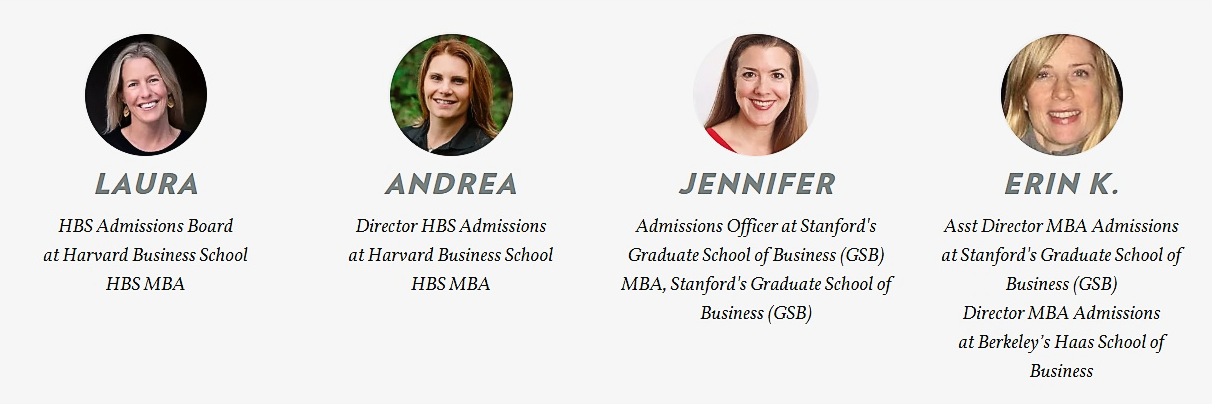 The post The Scoop On the MBA Elevator Pitch appeared first on Stacy Blackman Consulting - MBA Admissions Consulting. |
| FROM Stacy Blackman Consulting Blog: Make the Most of Your First Year at Business School |
 The Global Hub at Kellogg School of Management If you have started an MBA program this fall, congratulations! Your first year at business school is an exciting and transformative journey full of opportunities for growth, networking, and learning. To help you make the most of this crucial year, we’ve compiled some practical tips to guide you. Goals and Priorities for Your First Year at Business School Before you dive headlong into your first year, take some time to define your goals. What do you want to achieve during your time at business school? Whether gaining specific skills, building a professional network, or exploring entrepreneurial ventures, having clear objectives will keep you motivated and focused. Network, Network, Network Building relationships with your professors, classmates, and industry professionals is a cornerstone of MBA success. During your first year at business school, attend networking events, join student organizations, and participate in group projects. Networking isn’t just about who you know; it’s also about who knows you. Look beyond the usual suspects to connect with students outside your industry or background. “Every time I go back to a reunion, I have great conversations with people I didn’t know well in business school,” says Stacy Blackman, an alum of Kellogg School of Management. “I wish I had made more of an effort to break out of my obvious circles because it was such an incredibly diverse group of amazing people. And for me, it really is the people that are the lasting benefit of business school.”  Stay Open to New Experiences Business school is an opportunity to broaden your horizons. Be open to trying new things, whether that means taking classes outside your comfort zone or exploring different career paths. Embrace diversity and new perspectives; you’ll learn a lot from your peers. Former SBC client Nick joined the B-Schooled podcast to share his experiences applying to Stanford GSB and Harvard Business School. He ultimately chose HBS and, like many, had to overcome a bit of impostor syndrome when surrounded by people with such diverse and unusual backgrounds. “Overall, the highlight of HBS for me is having the time and opportunity to meet people who are so different from you, who come from such different backgrounds… That’s the thing I’m going to miss the most,” Nick notes. Even more than the incredible speakers, the exposure to new industries, and the Case Method, he says, “What will really stick with me is the time spent with really great people and talking about interesting things.” Listen to B-Schooled Podcast #2: Interview with SBC Client and Harvard MBA Nick Maximize Precious Resources Your business school offers many resources to support your academic and career goals. Take advantage of career services, guest speakers, academic advising, and mentoring programs. These resources can help you make informed decisions and connect with opportunities. “One of the big priorities for me when I was at Kellogg was attending as many speaker events as I could to soak up their messages and insights,” says SBC consultant/Kellogg MBA Beth, who was also the former director of full-time admissions at the Kellogg School of Management.  “I realized early on that by being at Kellogg, I had access that I was not going to have several years later. And so, I would make it a priority to attend different events to listen to really interesting senior people.” Listen to B-Schooled Podcast #86: Spotlight on Kellogg School of Management Get Real-World Experience Seek internships or part-time positions related to your career interests. Real-world experience can complement your classroom learning and make you more marketable to future employers. In addition, such experiences can also redirect you down surprising new paths. “My entrepreneurial journey unfolded unexpectedly,” Stacy shared on an episode of the B-Schooled podcast. “I didn’t go to business school planning to start my own company—I was at Kellogg planning to go into brand management. During the summer, I did an internship at Pilsbury and was brand manager for the Haagen Daz ice cream brand. And at the end of the summer I was really dissatisfied with my experience and felt discouraged because what was I going to do next if I didn’t continue my intended path of brand management?” Spoiler alert! She pivoted. Along with two classmates, Stacy created and sold a dotcom business during her second year and was forever smitten with entrepreneurial life. Listen to B-Schooled Podcast #150: Business School and the Entrepreneurial Journey Balance Work and Play It’s easy to get caught up in the hustle and bustle of business school, but don’t forget to have fun too! Build friendships, attend social events, and explore your school’s local community. The memories you create outside the classroom are just as valuable. While academics and networking are essential, remember to take care of yourself. Get enough sleep, eat well, and make time for physical activity. A healthy body and mind are crucial for performing at your best.  “The truth is business school is drinking from a fire hose. There are too many things to be able to do everything by a long shot,” says SBC’s Chandler Arnold. “What’s most important is finding a balance that includes time to rest, sleep, and occasionally recharge.” Enjoy the Journey Finally, remember that your time at business school is a unique and enriching experience. Enjoy the journey, savor the moments, and make the most of every opportunity that comes your way. Your first year is just the beginning of an exciting adventure in the world of business. Your first year at business school is a time of growth, learning, and self-discovery. You can make the most of this transformative time by setting clear goals, managing time effectively, building a robust network, and embracing new experiences. With dedication and a positive mindset, you’ll succeed academically and thrive personally and professionally. So, go forth confidently and make your first year at business school the stepping stone to a bright future. *** You’re in B-school now, but maybe you have a friend poised to embark on the MBA journey this season. Stacy Blackman Consulting can help! We offer multiple services to meet client needs, from our All-In Partnership to test prep to hourly help with targeted tasks. Request a free 15-minute advising session to talk strategy with a Principal SBC consultant. Meanwhile, here’s a snapshot of the caliber of expertise on our SBC team:  The post Make the Most of Your First Year at Business School appeared first on Stacy Blackman Consulting - MBA Admissions Consulting. |
| FROM Stacy Blackman Consulting Blog: The Best MBA Apps Have a Cohesive Narrative |
 When applying for an elite MBA program, it’s vital to make your application stand out from the crowd. But, the admissions committee is looking for more than impressive resumes and high GMAT scores. They want to get to know you, understand your motivations, and see how you’ll contribute to their program. One of the most effective ways to differentiate yourself is by crafting a compelling and cohesive narrative. After all, your MBA application is more than a collection of documents; it’s your story, journey, and vision for the future. Let’s walk through the process of weaving your own personal and professional journey into a captivating tale that admissions committees can’t resist. What are your chances of getting into a top business school? Contact us to talk strategy with a free 15-minute advising session with an SBC Principal Consultant.  A Cohesive Narrative Starts with Self-Reflection Your MBA application package should read like a captivating story with a beginning, middle, and end. It should:
To create a cohesive narrative, you need to have a clear understanding of your own story. What experiences have shaped you? What are your values, passions, and goals? Think about pivotal life moments and how they’ve influenced your desire to pursue an MBA. Share anecdotes and experiences that make you unique. You may have traveled the world for work, started a side hustle, or overcome a significant obstacle. Use these stories to show your resilience, adaptability, and problem-solving skills.  A ‘Novel’ Approach “I think of these application elements like chapters in a book,” SBC consultant Chandler Arnold explains on a recent B-Schooled podcast. “While you want each chapter to be compelling in its own, stand-alone way, your main goal is for these different pieces to function together as an overall narrative about you.” Listen to B-Schooled Podcast #175: Clear, Consistent, Cohesive MBA Applications Your narrative should also convey a sense of purpose. The AdCom wants to see that you clearly know what you want to achieve with an MBA. Do you aspire to lead a tech startup, manage a non-profit organization, or climb the corporate ladder? Your goals should be specific, realistic, and aligned with your past experiences and future ambitions. The application reader should be immediately able to connect the dots between your past, present, and future. Show how your current skill set and experiences have prepared you for the challenges of business school and your future career. At the same time, AdComs appreciate candidates who are self-aware and open to growth. Be honest about your weaknesses and share how you see their program helping you fill those gaps. Highlight specific aspects of the program that align with your goals and values. Explain why this school is the ideal place to pursue your MBA degree. Emphasize Soft Skills While technical skills and achievements are necessary, remember to emphasize your soft skills, too. Leadership, teamwork, communication, and empathy are key traits of successful MBA candidates. Share stories that showcase your ability to work well with others and your emotional intelligence. It can be tempting to embellish your achievements or write what you think the admissions committee wants to hear. Don’t do it! Authenticity is critical. Be yourself, and let your true personality shine through in your writing. Admissions committees can spot insincerity from a mile away. The more your unique and authentic narrative comes through the application materials, the more you will stand out from other applicants.-UVA Darden School of Business Edit and Seek Feedback Once you’ve written your narrative, don’t hit submit immediately. Take the time to edit and refine your essay. Check for typos and grammatical errors, which can detract from your message and professionalism. Read it aloud to ensure it flows smoothly. Most importantly, seek feedback from trusted friends, family members, or an admissions consultant who can provide valuable insights and suggestions. While telling your story thoroughly is essential, be mindful of word limits. Admissions committees appreciate candidates who can express themselves concisely. Remove any unnecessary details or redundancies and ensure every word serves a purpose.  Crafting a cohesive narrative for your MBA application is a critical step in the admissions process. It’s your opportunity to showcase your unique experiences, skills, and aspirations in a way that resonates with the admissions committee. So, take the time to reflect on your journey, set clear goals, and be authentic in your writing. With careful planning and a well-crafted narrative, you increase your chances of securing a spot in your dream MBA program. *** Stacy Blackman Consulting offers multiple services to meet your needs, from our All-In Partnership to test prep to hourly help with targeted tasks. Contact us today for a free 15-minute advising session to talk strategy with a Principal SBC consultant. Meanwhile, here’s a snapshot of the caliber of expertise on our SBC team:  The post The Best MBA Apps Have a Cohesive Narrative appeared first on Stacy Blackman Consulting - MBA Admissions Consulting. |
| FROM Stacy Blackman Consulting Blog: Top Three MBA Essay Mistakes |
 If you’re gearing up for business school applications, you know that your essays can make or break your chances of getting into your dream MBA program. While it’s essential to showcase your unique qualities and experiences, there are a few unwitting blunders that applicants often make when selecting their topics. Let’s dive into the three most common MBA essay mistakes and learn how to avoid them. What are your chances of getting into a top business school? Contact us to talk strategy with a free 15-minute advising session with an SBC Principal Consultant. Mistake #1: Ignoring the Essay Prompts One of the most frequent MBA essay mistakes applicants make is failing to pay close attention to the prompts provided by the schools. Sure, you may have a fantastic story about climbing Mount Everest, but if the essay prompt asks you to discuss your leadership experiences at work, you’re missing the mark. Read the prompts carefully and make sure your chosen topics directly address what the school is asking for. Don’t try to fit a square peg into a round hole. If you have a great story that doesn’t align with the prompt, save it for another essay or application.  Mistake #2: Going Generic Another major pitfall is crafting essays that are too generic and lack personalization. It’s easy to fall into the trap of writing what you think the admissions committee wants to hear rather than sharing your authentic self. Writing clichéd essays that could apply to any applicant won’t help you stand out from the competition. Instead, get personal! Share unique anecdotes, experiences, and insights that are specific to you. What sets you apart from other applicants? What are your passions, interests, and quirks? Use your essays as an opportunity to give the admissions committee a glimpse into your world. Listen to B-Schooled Podcast #3: Don’t Be Joe or Jane MBA Mistake #3: Overloading with Achievements While it’s important to highlight your accomplishments and strengths, some applicants make the mistake of turning their essays into a laundry list of achievements. They focus solely on what they’ve done without delving into the “why” or the impact of those accomplishments. Dig deeper instead of just listing achievements. Share the stories behind those achievements. What challenges did you overcome? What did you learn from your experiences? How have they shaped your aspirations and values? You’ll make your essays more engaging and meaningful by providing context and reflection. Bonus Tip: Avoid Copy-Pasting Another common mistake is using the same essay for multiple schools. While it might seem efficient, business schools seek applicants who genuinely want to be part of their specific program. Using a one-size-fits-all essay can signal a lack of genuine interest. Customize each essay for the school you’re applying to. Mention specific resources, professors, clubs, or initiatives at that school that align with your goals. Show that you’ve done your research and are excited about what the program offers. So, What Should You Do Instead?  Now that we’ve covered the biggest mistakes let’s talk about how to choose the right MBA essay topics that will make your application shine.
@stacyblackmanconsulting #dontoverthinkit #sbcyourfuture ? original sound – Stacy Blackman Consulting Selecting suitable MBA essay topics is about being genuine, personal, and connected to your goals. Avoid the common pitfalls of ignoring prompts, going generic, and overloading with achievements. Instead, focus on sharing your unique journey, embracing diversity, connecting with your aspirations, showcasing resilience, and infusing your essays with genuine passion. Remember, your essays are your opportunity to make a lasting impression, so make them count. Good luck with your MBA applications! *** Stacy Blackman Consulting offers multiple services to meet your MBA application needs, from our All-In Partnership to hourly help reviewing your MBA resume. Contact us today for a free 15-minute advising session to talk strategy with a Principal SBC consultant. Meanwhile, here’s a snapshot of the caliber of expertise onour SBC team.  The post Top Three MBA Essay Mistakes appeared first on Stacy Blackman Consulting - MBA Admissions Consulting. |
| FROM Stacy Blackman Consulting Blog: Best Ways for MBA Applicants to Answer Video Questions |
 For many business schools, video questions are now a required component of their MBA application. The uncertainty of not knowing what they’ll ask can be daunting—but try to keep your nerves in check. In this post, we’re going to share some battle-tested strategies to help you conquer those MBA admissions video essays, no matter what they throw your way. Before diving into preparation, it’s essential to grasp why MBA programs include video essays in their admissions process. These videos assess your communication skills, creativity, poise under pressure, and ability to think on your feet. Keep this in mind as you prepare, as it will help you tailor your responses effectively. What are your chances of getting into a top business school? Contact us to talk strategy with a free 15-minute advising session with an SBC Principal Consultant. Preparing for Video Questions Begin with self-reflection. What experiences, values, and aspirations make you unique? Knowing your story is crucial because it forms the foundation of your responses. Consider your professional journey, personal growth, and why you’re pursuing an MBA. While you can’t predict the exact questions, common themes often appear in MBA video essay questions. These include your career goals, leadership experiences, challenges you’ve overcome, and your fit for the program. Familiarize yourself with these topics and brainstorm potential responses.  Most questions will revolve around your experiences and goals, but there may be unexpected or quirky prompts. Stay adaptable and composed when faced with these curveballs. Use creativity and critical thinking to tackle them. A well-structured response can make a significant difference. Consider using the STAR (Situation, Task, Action, Result) or CAR (Context, Action, Result) method to frame your answers. This structure ensures you provide a complete response, showcasing your problem-solving skills. Hear Stacy’s take on why the STAR technique is your best interview/essay friend. @stacyblackmanconsulting Try the STAR technique to ace your interview. #sbcyourfuture #interviews #mba #bschoolprep #admissions #admissionscounselor #mbaapplication ? original sound – Stacy Blackman Consulting Practice Makes Perfect Get comfortable speaking in front of a camera by practicing regularly. Ensure your recording setup is reliable. Test your camera, microphone, and internet connection well in advance. Have a backup plan in case of technical glitches or power outages. You can use sample questions from MBA programs or record yourself responding to random prompts. This helps you build confidence and improve your delivery. Then share your practice videos with trusted friends or mentors for feedback. They can provide valuable insights on your delivery, content, and overall impact. Constructive criticism is a powerful tool for improvement. Did you know Stacy Blackman Consulting offers a la carte MBA interview prep specifically for video questions? Learn more about this valuable service here.  Remember, most video essays have time limits for each question. Practice managing your time effectively to ensure you cover all critical points within the given timeframe. Remember, it’s better to provide a concise, well-structured answer than to ramble on. Also, pay attention to your body language, facial expressions, and tone of voice. Smile naturally, maintain eye contact with the camera, and use hand gestures sparingly. Your non-verbal cues can convey confidence and engagement. Finally, avoid memorizing scripted answers. Authenticity comes through, and admissions committees appreciate genuine responses. Speak from the heart, and let your passion and personality shine in your videos. Listen to B-Schooled Podcast #20: How to Ace Your Video Essays On V-Day On the day of your video essay session, take a few deep breaths to calm your nerves. Remember that you are more than your answers in these videos. You’ve worked hard to reach this stage, and your application represents the culmination of your efforts. In the end, preparing for MBA admissions video questions without knowing the specific prompts requires a mix of self-awareness, practice, and adaptability. Approach each question with a clear structure, authentic storytelling, and confidence. Next, embrace the opportunity to showcase your unique qualities and why you’re an excellent fit for the MBA program. With the right preparation and mindset, you can excel in your video essays and take a significant step toward achieving your MBA aspirations. Good luck! *** Stacy Blackman Consulting offers multiple services to meet your MBA application needs, from our All-In Partnership to hourly help reviewing your MBA resume. Contact us today for a free 15-minute advising session to talk strategy with a Principal SBC consultant. Meanwhile, here’s a snapshot of the caliber of expertise on our SBC team.  The post Best Ways for MBA Applicants to Answer Video Questions appeared first on Stacy Blackman Consulting - MBA Admissions Consulting. |
| FROM Stacy Blackman Consulting Blog: B-Schooled Podcast Episode #178: Lessons Learned From SBC Alums After Their First Year (Part Two) |
 In this episode of B-Schooled, we sit down with SBC alum Whitney, who just completed her first year at Stanford—along with two different summer internships. Whitney comes from the social impact world and shares lots of great information in this discussion, including: • The best decision she made during her first year, • One thing she would do differently about her first year, • Suggestions for those wanting to make the most out of their internship experience (and for those considering two different internship experiences), • Tips for those interested in the social impact space, and • Advice about taking risks. This podcast is a must for anyone interested in making the most out of their first year, anyone passionate about social impact, or anyone interested in learning more about the Stanford GSB student experience. This B-Schooled episode can be found here, or take a listen on any of the major podcast platforms below. B-Schooled is available on most major podcast apps, including: Apple Podcasts Spotify Stitcher TuneIn Please be sure to subscribe to B-Schooled so that you don’t miss a thing. Also, if there’s something you’d like for us to cover in a future episode, please email podcast@stacyblackman.com. We’d love to hear from you! The post B-Schooled Podcast Episode #178: Lessons Learned From SBC Alums After Their First Year (Part Two) appeared first on Stacy Blackman Consulting - MBA Admissions Consulting. |
| FROM Stacy Blackman Consulting Blog: How a Campus Visit Can Strengthen Your MBA Application |
 Are you neck-deep in the MBA application process? Then you’re probably in the throes of GMAT prep, crafting impeccable essays, and assembling your recommendation letters. But have you considered the value of a campus visit in this whirlwind journey? Stepping onto the hallowed grounds of your dream business school can provide invaluable insights and demonstrate your commitment. Unfortunately, it’s not a golden ticket to admission. Let’s explore how a campus visit can enhance your MBA application even though it’s not a requirement to get in. What are your chances of getting into a top business school? Contact us to talk strategy with a free 15-minute advising session with an SBC Principal Consultant. The Campus Visit: The Power of First Impressions Imagine this: You’re applying to multiple MBA programs, most of which are top-tier institutions that receive thousands of applications yearly. What can set you apart in a sea of talented candidates? The answer lies in the power of first impressions.  A campus visit allows you to familiarize yourself with the school’s environment, culture, and ethos. When you walk through the campus gates, you’re not just a faceless name on an application—it’s an opportunity to become a flesh-and-blood person with a sincere interest in their program. Admissions committees value students who fit into their school’s culture and can contribute positively to the community. A visit lets you show that you’re not just after the prestige of the school but also genuinely interested in being a part of it. “When applying to business schools last year, it seemed like most of the schools were very similar. However, after I attended Fuqua’s Pride Weekend, a mock class visit, and an admissions information session, I noticed how Fuqua and its students had unique values that aligned with my own.” Trevor Tuplin, Duke Fuqua MBA Class of 2024 Networking Opportunities One of the most significant advantages of a campus visit is the chance to network. Business schools thrive on connections; you can interact with current students, professors, and alumni during your visit. These interactions can provide valuable insights about the program and help you understand if it’s the right fit for you. Remember, your future classmates could be prospective business partners or mentors. Building relationships during your visit might open doors to collaborative opportunities down the line. Plus, mentioning these connections in your application essays or interviews can demonstrate your proactive approach and genuine interest in the school.  Photo Credit: Fuqua School of Business Personalizing Your Application When you visit a campus, you gain a unique perspective that you can use to personalize your application. You can mention specific details about the campus, the professors you met, or the classes you observed in your essays or interviews. This shows that you’ve gone the extra mile and can create a compelling narrative that aligns with the school’s values and your aspirations. For example, you might write, “During my visit to XYZ Business School, I was deeply impressed by the close-knit community and the collaborative atmosphere. My conversation with Professor Smith about his research in sustainable business practices resonated with my own interest in sustainability, and I can see myself thriving in this environment.” Demonstrating Commitment Applying to an MBA program is a significant investment of time, effort, and money. A campus visit is a tangible way to demonstrate your commitment to a particular school. It shows that you’ve taken the time to explore the campus, meet with faculty, and engage with the community. Admissions committees appreciate applicants who are genuinely interested in their program, as it often translates to a higher likelihood of accepting an offer if extended. Partner with Stacy Blackman’s best-in-class GMAT and GRE experts and increase your score significantly. Check out our test prep services here. Request a free game plan chat with SBC’s lead test prep coach by emailing testprep@stacyblackman.com. But… It’s Not a Requirement While a campus visit can undoubtedly bolster your application, it’s crucial to emphasize that it’s not a mandatory step. Many applicants secure spots at their dream MBA programs without ever setting foot on campus. Admissions committees understand that visiting every school on your list might be financially and logistically challenging, especially if you apply to multiple programs. Moreover, due to the COVID-19 pandemic, many schools still offer virtual tours and online information sessions, making it easier for applicants to get a sense of the campus from afar. So, if visiting in person isn’t feasible, don’t worry. You can still show interest through virtual engagement, research, and thoughtful essays.  In the end, a campus visit can enhance your MBA application by providing you with a deeper understanding of the school, opportunities to network, and the chance to personalize your application. It’s a powerful way to make a memorable impression on the admissions committee and showcase your commitment to the institution. However, it’s essential to strike a balance. If visiting every campus on your list is impractical, don’t despair. Make the most of virtual resources and online engagement opportunities the schools provide. Remember that your application as a whole, including your essays, test scores, recommendations, and interview performance, carries significant weight in the admissions process. Ultimately, an MBA program is looking for more than just a face in the crowd; they want candidates who will enrich their community and excel in their program. Whether you visit in person or virtually, your genuine passion, dedication, and qualifications will determine your MBA application success. So, visit if you can, but rest assured that it’s not the only path to your dream MBA program. *** Stacy Blackman Consulting offers multiple services to meet your MBA application needs, from our All-In Partnership to hourly help reviewing your MBA resume. Contact us today for a free 15-minute advising session to talk strategy with a Principal SBC consultant. Meanwhile, here’s a snapshot of the caliber of expertise on our SBC team. 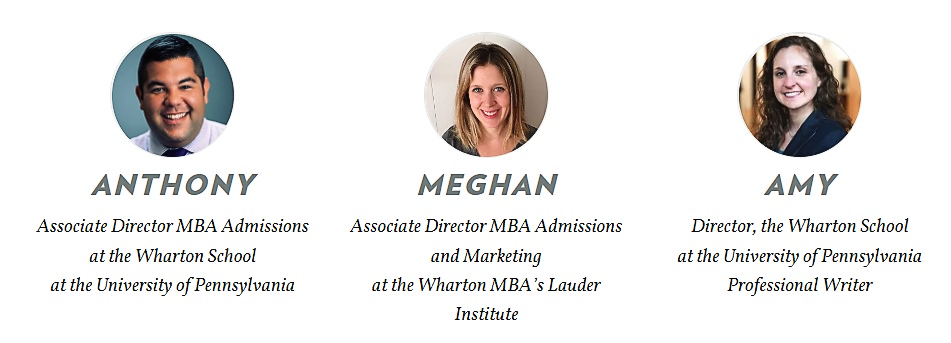 The post How a Campus Visit Can Strengthen Your MBA Application appeared first on Stacy Blackman Consulting - MBA Admissions Consulting. |
| FROM Stacy Blackman Consulting Blog: 7 Ways You’ll Unlock Your Career Potential with an MBA |
 Are you feeling stuck in your career, watching opportunities pass you by? Do you think your salary isn’t reflecting your hard work and dedication? If so, you’re not alone. SBC often meets clients at a career crossroads who want to break through barriers to reach their full potential. The MBA degree is a game-changer that can propel your career to new heights. It can also help you secure the position and salary you deserve. Learn seven different ways you can unlock your career potential with an MBA. What are your chances of getting into a top business school? Contact us to talk strategy with a free 15-minute advising session with an SBC Principal Consultant. 1. Enhanced Skillset and Knowledge One of the primary benefits of earning an MBA is gaining valuable skills in areas such as leadership, finance, marketing, strategy, and operations. These skills make you a more attractive candidate for higher positions. Think about it—when you can handle complex financial analyses, create and execute strategic plans, and lead teams effectively, you become an indispensable asset to your organization. Employers value the knowledge and problem-solving abilities that MBA graduates bring to the table.  2. Networking Opportunities Networking is a powerful tool for career advancement. One of the biggest advantages of pursuing an MBA is the chance to build a robust professional network. Your fellow MBA students, professors, and alums will become valuable connections that open doors to job opportunities, mentorship, and collaborations. When you’re part of an MBA program, you’re not only gaining knowledge. You’re also entering a community of like-minded individuals with diverse backgrounds and experiences. This network can help you access hidden job markets, connect with influential industry leaders, and receive guidance from mentors who have been in your shoes. Listen to B-Schooled Podcast #70: Why Now for Your MBA? 3. Increased Credibility Let’s face it—having an MBA on your resume boosts your credibility. Employers view MBA grads as people with a strong work ethic and committed to self-improvement. This credibility can be a game-changer when vying for a promotion or negotiating your salary. When you’re up for a new role or discussing compensation, having an MBA can give you a competitive edge. It signals to employers that you have the knowledge and skills necessary to excel in your position and contribute to the company’s growth. 4. Leadership Development Leadership is more than a title; it’s a set of skills and qualities that enable you to inspire and guide others towards achieving common goals. MBA programs emphasize leadership development, teaching you how to lead by example, communicate effectively, and make strategic decisions.  Employers value individuals who can lead teams and drive organizational success. As you develop your leadership capabilities during your MBA journey, you become an attractive candidate for positions of greater responsibility. Leadership roles usually come with higher salaries, reflecting your increased impact on your organization’s bottom line. 5. Access to Exclusive Job Opportunities Top-tier business schools have strong connections with leading companies and organizations. Such connections provide an immediate boost to your career potential with an MBA and can translate into exclusive job opportunities unavailable to non-MBA candidates. Recruiters seek these MBA grads because they know they’re getting people with a proven commitment to their professional development. MBA programs have dedicated career services teams that assist students with job placement and offer resources such as job fairs, company visits, and interview coaching. These services can significantly improve your chances of landing positions that match your qualifications and salary expectations. 6. Global Perspective A global perspective is a significant asset in today’s interconnected world. Many MBA programs often offer international exposure through study abroad opportunities, global consulting projects, and interactions with a diverse cohort of students. This global perspective can be a key differentiator in your career journey.  Now more than ever, employers want to hire professionals who can navigate the complexities of international markets and cultures. An MBA with international experience can help you land positions with a global scope, often accompanied by competitive salary packages. 7. Salary Negotiation Skills Securing the position you deserve also hinges on your ability to negotiate a fair salary. MBA programs often include courses or workshops on negotiation techniques, empowering you to advocate for yourself during salary negotiations. With the right negotiation skills, you can confidently communicate your value to prospective employers and ensure that your compensation aligns with your qualifications and industry standards. This skill alone can make a huge difference in your earnings throughout your career. According to the Bureau of Labor Statistics, the average salary in 2022 for master’s degree holders is $81,848. Yet, the median base salary for HBS graduates is $175,000. Earning an MBA doesn’t guarantee a specific salary, but it can increase your earning potential. Source: Harvard Business School In the end, pursuing an MBA is a transformative journey that equips you with the knowledge, skills, and confidence to get the position and salary you deserve. Your career potential with an MBA is limitless; the degree opens doors to new opportunities, expands your network, and prepares you for leadership roles in your chosen field. While it requires a significant investment of time and resources, the long-term benefits far outweigh the initial costs. Remember, your career is a journey, not a destination. An MBA can be the compass that guides you toward your desired goal, helping you unlock your full potential and achieve the success you’ve always envisioned. *** Stacy Blackman Consulting offers multiple services to meet your MBA application needs, from our All-In Partnership to hourly help reviewing your MBA resume. Contact us today for a free 15-minute advising session to talk strategy with a Principal SBC consultant. Meanwhile, here’s a snapshot of the caliber of expertise on our SBC team.  The post 7 Ways You’ll Unlock Your Career Potential with an MBA appeared first on Stacy Blackman Consulting - MBA Admissions Consulting. |
| FROM Stacy Blackman Consulting Blog: B-Schooled Podcast Episode #179: What Do You Bring to an MBA Program? |
 In order to claim a spot at your dream school, it’s critical that you find a way to let the admissions committee know what your classmates will learn from you and how you’ll be an asset to their program. However, since most schools don’t come right out and ask you to address what you’ll bring to the school’s community, you need to find a way to convey that information throughout your materials. In this encore episode, we cover ways to communicate the knowledge, experience, soft skills, and interests you’ll contribute to class discussions and be able to bond over with your fellow students. Listen to B-Schooled episode #179 here or on any of the podcast apps listed below. B-Schooled is available on most major podcast apps, including: Apple Podcasts Spotify Stitcher TuneIn Please be sure to subscribe to B-Schooled so that you don’t miss a thing. Also, if there’s something you’d like for us to cover in a future episode, please email podcast@stacyblackman.com. We’d love to hear from you! The post B-Schooled Podcast Episode #179: What Do You Bring to an MBA Program? appeared first on Stacy Blackman Consulting - MBA Admissions Consulting. |
| FROM Stacy Blackman Consulting Blog: Why It’s Good to Be a Non-Traditional MBA Applicant |
 Are you considering pursuing an MBA but feel uncertain because you come from a non-traditional background? You’re not alone. Prospective students often worry their unique career paths don’t align with the typical MBA profile. But we’re here to tell you that being a non-traditional MBA applicant comes with many virtues and strengths. In fact, it might be just the ticket to stand out in the competitive world of business school admissions. Are you a non-traditional MBA aspirant and curious about your chances of getting into a top business school? We’d love to chat! Contact us to talk strategy with a free 15-minute advising session with an SBC Principal Consultant. After all, business schools value diversity in many forms, from nationality to professional experiences, educational backgrounds, and personal journeys. When you come from a non-traditional background, you offer a different viewpoint that can inspire innovative thinking. Reflect on your accomplishments, skills, and experiences that set you apart. Non-traditional backgrounds often bring uncommon strengths, so identify and highlight them.  The Non-Traditional MBA Applicant Has a Unique Toolkit Imagine discussing a case study in entrepreneurship. In that situation, “traditional” students might focus on established business models. Meanwhile, your background as an artist, engineer, or social worker could lead you to propose creative and unconventional solutions others might overlook. This diversity in thought can enrich the learning experience for everyone. If the pandemic taught us anything, it’s that resilience and adaptability are vital traits. They are also ones that non-traditional MBA applicants often have in spades. After all, you’ve already navigated unconventional paths in your career or education. This likely means you’ve encountered and overcome many challenges. Such experiences have honed your ability to adapt to new environments, learn fast, and persevere. The ability to adapt to new subjects, teaching styles, and networking opportunities you’ll find at B-school is invaluable. Your non-traditional background has equipped you with the skills to tackle the rigors of an MBA program head-on. Every background brings special abilities to the table. These transferable skills are a tremendous asset in a business context. Listen to B-Schooled Podcast #137: Doubting Yourself? This Could Be a Good Thing For instance, a background in the arts can help you excel in marketing and branding as you understand the importance of storytelling and visual appeal. Engineers often shine in operations and supply chain management due to their precision and analytical prowess. Your non-traditional skills can give you a competitive edge in your chosen post-MBA field. On the UCLA Anderson MBA Insider’s Blog, Cassandra Ronquillo (’24) perfectly encapsulates why it’s cool to be unconventional. “One of my biggest insecurities turned out to be my biggest differentiator in my business school apps and in my internship interviews,” she explains. “While I thought my job was the least ‘cool’ because it wasn’t as recognizable or as common as those coming to business school, it provided me with ample opportunities to share what I did and highlight the impact I made. It also provided me with meaningful and memorable conversations with students, admissions folks, recruiters, and tech interviewers,” Ronquillo adds. “Sorry traditional candidates, but non-traditional candidates are coming in hot with our memorable differentiators!” Own Your Story Admissions committees love a compelling story. In our experience, non-traditional applicants often have fascinating narratives to share. Whether you’ve pursued a passion project, volunteered in remote areas, or started a small business, your journey off the beaten path can impress the admissions team. Those experiences can lead to memorable application essays and interviews that set you apart from other candidates.  Choosing an MBA after a non-traditional path demonstrates your passion and commitment to your goals. You’ve made a conscious decision to pivot in your career or seek more education. That choice shows determination and a willingness to invest in your future. Plus, your unconventional background suggests that you aren’t seeking an MBA just because it’s the next logical step. Rather, you genuinely believe in the transformative power of business education and see how it will enhance your capabilities and broaden your horizons. Client Case Study: How the GRE® General Test Can Complement an Unconventional Applicant Without a doubt, the non-traditional MBA applicant should embrace their unique background and experience. They bring diversity, skills, storytelling power, and passion to the MBA classroom. So, don’t let your non-traditional background hold you back. Instead, use it to propel you forward on your journey into the business world. Your path may be unconventional, but it’s also what makes you a remarkable candidate for an MBA program. So, believe in yourself, showcase your strengths, and approach the application process with determination and authenticity. Success may be closer than you think. *** Do you have a non-traditional background? Stacy Blackman Consulting offers multiple services to meet your MBA application needs, from our All-In Partnership to essay editing to hourly help reviewing your MBA resume. Contact us today for a free 15-minute advising session to talk strategy with a Principal SBC consultant. Meanwhile, here’s a snapshot of the caliber of expertise on our SBC team.  The post Why It’s Good to Be a Non-Traditional MBA Applicant appeared first on Stacy Blackman Consulting - MBA Admissions Consulting. |
| FROM Stacy Blackman Consulting Blog: MBA Applicants with a Family Business Background |
 Embarking on the path to land a spot in an elite business school is an exciting yet demanding endeavor, especially for those whose professional background is in the family business. Successfully positioning your candidacy and work experience is vital for making a compelling case to admission committees. Today, we’re sharing strategic advice on how MBA applicants with a family business background can stand out and secure a coveted seat in a top program. Are you a non-traditional MBA aspirant and curious about your chances of getting into a top business school? We’d love to chat! Contact us to talk strategy with a free 15-minute advising session with an SBC Principal Consultant. Your experience in a family business is more than a job—it’s a narrative that sets you apart. Begin your application by communicating the story behind your role. Share the challenges, triumphs, and the lessons learned. Admissions committees value authenticity, and your genuine passion for your family business can be an appealing differentiator. Paint a clear picture of your vision for the company’s future, and leave no doubt as to how an MBA will help you make an impact on the business after graduation. That way, the admissions committee understands why business school is the logical next step. Focus Areas In the competitive MBA landscape, showcasing impact is crucial. Play up instances where you’ve contributed to growth and innovation in your family business. Quantify achievements where possible, emphasizing revenue growth, cost savings, or successful strategic initiatives. This underscores your business acumen and indicates your ability to drive meaningful results. Without a doubt, working in a family business presents unique challenges. Rather than avoiding them, position these challenges as valuable learning opportunities. Discuss how you navigated uncertainties, resolved conflicts, and adapted to industry changes. Admissions committees appreciate resilience and problem-solving skills, and your experience in a family business can demonstrate your ability to thrive in dynamic environments. Also, keep in mind that many top B-schools have extensive resources for MBA applicants with a family business background. Northwestern’s Kellogg School of Management, for example, has pioneered family enterprise education with its John L. Ward Center for Family Enterprises. “The vast majority of businesses around the world are family businesses, and they drive significant innovation and growth in our global economy,” says Francesca Cornelli, dean of the Kellogg School.  Family businesses demand a delicate balance of collaboration and leadership. Mention instances where you’ve led cross-functional teams or improved communication within the family business. Highlighting your ability to navigate interpersonal dynamics positions you as a candidate with strong leadership potential—an appealing trait for elite MBA programs. Recommendation Letters for MBA Applicants with a Family Business Background Choosing the right people for recommendations is crucial—and sometimes tricky for MBA applicants with a family business background. Pick recommenders who can speak to your professional capabilities and personal attributes. If there’s a non-family member in a leadership position within the family business, consider getting their recommendation. That can add an outside perspective and establish your ability to work effectively with diverse individuals. Alternatively, a recommendation from a client or business partner can validate your professional skills and impact on business relationships. This type of recommendation emphasizes your ability to build and maintain external connections, which is valuable in a business school setting. Consider having a mix of recommenders to provide a comprehensive view of your skills and character. Listen to B-Schooled Podcast #127: How to Pick the Right Recommenders In some cases, admissions committees may raise questions about the breadth of your experience within a family business. Proactively address these concerns by calling attention to the range of your responsibilities. Share how you’ve contributed to different facets of the company, from operations to strategic planning. Exhibiting a well-rounded skill set eases any concerns about a limited scope of experience. Finally, remember that top MBA programs look for candidates committed to continuous learning. Emphasize any steps you’ve taken to enhance your skills and knowledge. This could include pursuing relevant certifications, attending industry conferences, or enrolling in executive education programs. Noting your commitment to staying on top of industry trends bolsters your proactive approach to personal and professional development.  Own Your Family Business Cred As you launch your transformative journey towards an elite MBA, know that your family business experience is a unique asset. Create a compelling narrative that celebrates your achievements and the valuable skills you’ve gained along the way. By strategically positioning your family business experience, you enhance your candidacy and provide a distinctive perspective to the diverse community of an elite business school. *** Do you have a non-traditional background? Stacy Blackman Consulting offers multiple services to meet your MBA application needs, from our All-In Partnership to essay editing to hourly help reviewing your MBA resume. Contact us today for a free 15-minute advising session to talk strategy with a Principal SBC consultant. Meanwhile, here’s a snapshot of the caliber of expertise on our SBC team.  The post MBA Applicants with a Family Business Background appeared first on Stacy Blackman Consulting - MBA Admissions Consulting. |
| FROM Stacy Blackman Consulting Blog: B-Schooled Podcast Episode #180: Reflections From My 20-Year HBS MBA Reunion |
 This past June, B-Schooled co-host Erika returned to Boston for her 20-year Harvard Business School reunion. In the first part of this two-episode arc, she’ll detail the extended weekend’s itinerary and share some insights on how this reunion was different from past events. In part two, Erika will dive into the classroom sessions she attended and what she took away from the experience. Whether you’re targeting HBS or are just curious to hear how MBA grads reflect on their program experience once it’s in the rearview mirror, this podcast provides a sneak peek into the reunion experience at a top business school. Listen to B-Schooled episode #180 here or on any of the podcast apps listed below. B-Schooled is available on most major podcast apps, including: Apple Podcasts Spotify Stitcher TuneIn Please be sure to subscribe to B-Schooled so that you don’t miss a thing. Also, if there’s something you’d like for us to cover in a future episode, please email podcast@stacyblackman.com. We’d love to hear from you! The post B-Schooled Podcast Episode #180: Reflections From My 20-Year HBS MBA Reunion appeared first on Stacy Blackman Consulting - MBA Admissions Consulting. |
| FROM Stacy Blackman Consulting Blog: The ROI of an MBA |
 Does Program Length Matter? An MBA at a top-ranked business school doesn’t come cheap. If you’re thinking about the ROI of an MBA, ask yourself these questions:
Curious about your chances of getting into a top B-school? Contact us to talk strategy with a free 15-minute advising session with an SBC Principal Consultant.  MBA in One Year A one-year MBA program is like drinking from the proverbial firehose. It’s a fast and focused launch where, in just 12 months, you gulp down a concentrated dose of business knowledge and thrust yourself back into the job market. A shorter program means lower tuition and living expenses. Plus, you start earning again sooner than your two-year program peers, and so can potentially recoup your investment faster. These programs often attract students with a more extensive work history. “Without a summer internship, the one-year MBA doesn’t offer the same kind of stable path to a job and therefore is more for career advancers than switchers,” MBA.com explains. If you’re already a seasoned professional, a one-year MBA might help you enhance your skills and career quickly. On the negative side of the ledger, networking opportunities may feel rushed with a one-year program. Building meaningful connections can be challenging in a condensed timeframe. Also, because of the shorter duration, one-year programs offer fewer elective courses. If you hope to do a deep dive into a certain business topic, this limitation could be a drawback.  MBA in Two Years While that firehose analogy still describes the feeling that many two-year MBA students have, the pace is definitely more leisurely in comparison. The number-one benefit many business school grads cite is the network they built during their MBA. Two years provides ample time to create a robust professional and personal network. Students can attend more networking events and join extracurricular activities that forge stronger connections. If you’re unsure about your career path, a two-year program allows you to try various courses and specializations. With more time on your side, you can participate in skill-building workshops, leadership programs, and other extracurricular activities that contribute to a well-rounded education. It’s like a buffet of business knowledge, helping you find your true passion. Plus, two-year programs include a summer internship. This experience not only provides a break from coursework but also valuable real-world exposure and, yes, more networking opportunities! The obvious downside of a two-year MBA program is the extended financial commitment. You’ll have higher tuition costs, living expenses, and the opportunity cost of not working for two years. While you’re gaining in-depth knowledge, your one-year program peers are already in the workforce. The trade-off between knowledge depth and early career entry can be a crucial consideration.  Comparing the ROI of an MBA in One Vs. Two Years While there’s some debate as to whether the ROI of an MBA is the same no matter which program route you take, many believe the long-term ROI of a two-year program wins out. As the Rice Jones Graduate School of Business argues, “Graduates of two-year programs experience a return on investment over their lifetime that the one-year model simply cannot match.” “One-year MBA students do not have much time for networking and relationship building. They jump right away into the full-time job search while cramming their coursework into a single year. “Because of the limited time frame, one-year students have less time to attend events, meet faculty and alumni, and participate in extracurricular activities than their two-year peers. As a result, it’s harder for them to create genuine, sustainable connections and explore as many career paths as two-year MBA students.” For those entering the MBA journey with an open mind, the two-year program allows a more thorough exploration of various specializations. The flexibility to try different classes can lead to a more informed career choice, potentially landing you in a field that aligns better with your passions and, consequently, promises a higher earning potential. Also, with another year of academic preparation, two-year program graduates may find themselves better equipped to navigate the competitive job market. The deeper understanding of business intricacies, coupled with the extra time for skill development, positions them as more attractive candidates for employers seeking well-rounded professionals. For some industries, such as investment banking, internships are particularly important. A one-year MBA program is unlikely to provide that critical experience. —Rice Jones Graduate School of Business The extended timeframe of a two-year program allows for more comprehensive skill-building initiatives, leadership programs, and involvement in extracurricular activities. This holistic approach to education fosters personal and professional growth, making graduates not just academically adept but also well-rounded individuals equipped for the complexities of the business world. What Matters Most to You? Your personal return on investment, however, is something quite different. Transitioning into a lower-paying but more rewarding job may be well worth it. You can’t measure that kind of personal satisfaction in dollars and cents. Ultimately, the decision between a one-year and a two-year MBA program comes down to your individual goals, career stage, and preferences. If you’re seeking a rapid career boost and are already an experienced professional, a one-year program might be your ROI-optimized path. On the other hand, if you value a deeper dive into business, extensive networking, and the flexibility to explore various specializations, a two-year program might offer a more fulfilling ROI. In the end, it’s about aligning your program choice with your unique aspirations and circumstances. *** Stacy Blackman Consulting offers multiple services to meet your needs, from our All-In Partnership to test prep to hourly help with targeted tasks. Contact us today for a free 15-minute advising session to talk strategy with a Principal SBC consultant. Here’s a snapshot of the caliber of expertise on our SBC team.  The post The ROI of an MBA appeared first on Stacy Blackman Consulting - MBA Admissions Consulting. |

|
|
||